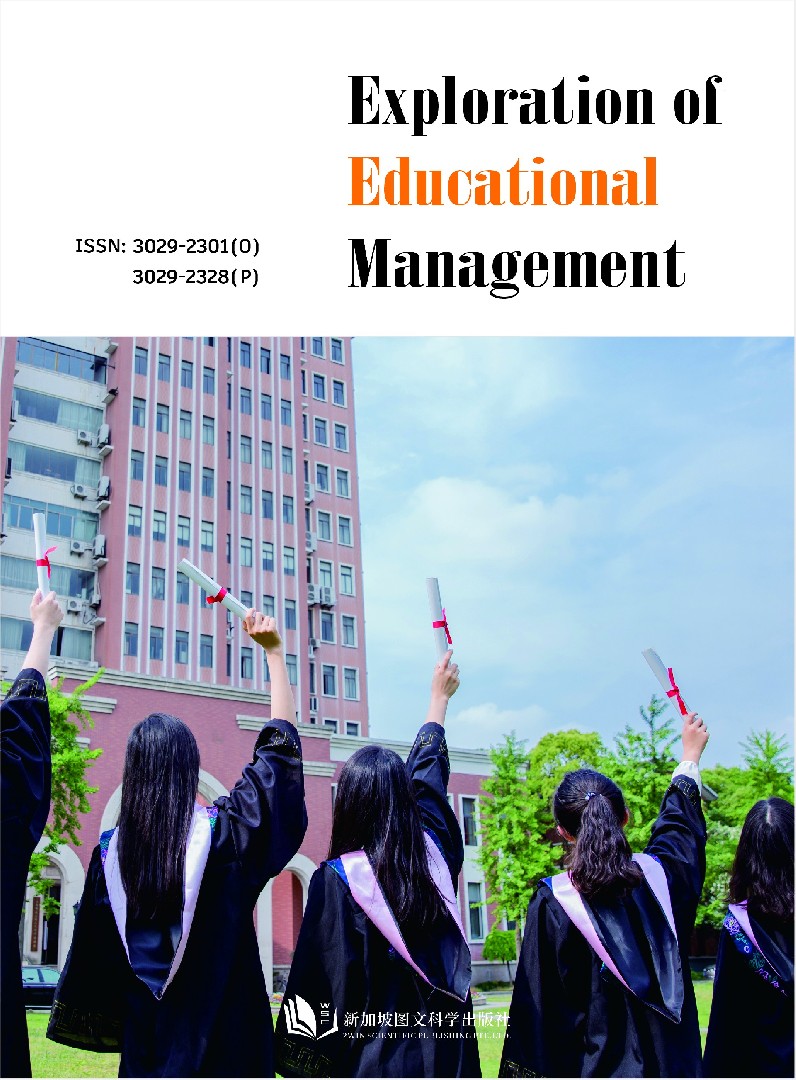作者
Rentao Wang
文章摘要
Teacher support is crucial in second language acquisition, influencing students’ psychological state and learning behavior through multi-dimensional support. Based on the framework of social support and self-determination theory, research on teacher support explores the influence of key areas such as emotional support, academic support, and autonomous support on learning engagement, academic emotions, and academic achievement. Related research shows that teacher support improves academic performance by enhancing students’ sense of belonging, self-confidence, and self-efficacy, promoting learning motivation and engagement. Academic emotion and engagement play an important mediating role between teacher support and academic achievement. Future research could focus on teacher support in different forms and contexts, including online learning, cross-cultural backgrounds, and the effect of individual differences, to provide more personalized teacher support strategies for students.
文章关键词
teacher support; Second Language Acquisition; academic engagement; academic emotions; academic achievement
参考文献
[1] Brophy,J.(2004).Motivating students to learn.Routledge.
[2] Carver,C.S.,&Scheier,M.F.(2001).On the self-regulation of behavior.Cambridge University Press.
[3] Chong,W.H.,Liem,G.A.D.,Huan,V.S.,Kit,P.L.,&Ang,R.P.(2018).Student perceptions of self-efficacy and teacher support for learning in fostering youth competencies:Roles of affective and cognitive engagement.Journal of adolescence,68,1-11.
[4] Cohen,S.,&Wills,T.A.(1985).Stress,social support,and the buffering hypothesis.Psychological bulletin,98(2),310.
[5] Deci,E.L.,&Ryan,R.M.(1985).Intrinsic motivation and self-determination in human behavior.New York:Plenum.
[6] Deci,E.L.,&Ryan,R.M.(2000).The"what"and"why"of goal pursuits:Human needs and the self-determination of behavior.Psychological inquiry,11(4),227-268.
[7] Dewaele,J.M.,Witney,J.,Saito,K.,&Dewaele,L.(2019).Foreign language enjoyment and anxiety:The effect of teacher and learner variables.Language Teaching Research,23(3),372-393.
[8] Dong,L.(2024).“Does my teacher believe I can improve?”:The role of EFL learners’meta-lay theories in their growth mindset and online self-regulation.System,122,103269.
[9] Dörnyei,Z.(2009).The psychology of second language acquisition.Oxford University Press.
[10] Epstein,J.(2018).School,family,and community partnerships,student economy edition:Preparing educators and improving schools.Routledge.
[11] Ertmer,P.A.,&Ottenbreit-Leftwich,A.T.(2013).Removing obstacles to the pedagogical changes required by Jonassen’s vision of authentic technology-enabled learning.Computers&Education,64,175-182.
[12] Furrer,C.,&Skinner,E.(2003).Sense of relatedness as a factor in children's academic engagement and performance.Journal of educational psychology,95(1),148.
[13] Hejazi,S.Y.,&Sadoughi,M.(2023).How does teacher support contribute to learners’grit?The role of learning enjoyment.Innovation in Language Learning and Teaching,17(3),593-606.
[14] House,J.S.(1981).Work stress and social support.Reading,MA:Addison-Wesley.
[15] Jiang,Z.H.,Zhao,C.L.,Li,H.X.,Huang,Y.&Shu,F.F.(2018).Construction of the Model of Online Learner-Perceived Teacher Support Behavior.China Educational Technology,(11),103-110.(in Chinese).
[16] Lazarides,R.,Gaspard,H.,&Dicke,A.L.(2019).Dynamics of classroom motivation:Teacher enthusiasm and the development of math interest and teacher support.Learning and Instruction,60,126-137.
[17] Lei,H.,Cui,Y.,&Chiu,M.M.(2018).The relationship between teacher support and students’academic emotions:A meta-analysis.Frontiers in psychology,8,2288.
[18] Li,X.,Zhang,F.,Duan,P.,&Yu,Z.(2024).Teacher support,academic engagement and learning anxiety in online foreign language learning.British Journal of Educational Technology,55(5),2151-2172.
[19] Liu,L.,Guan,W.J.,Qiu,Y.,&Lee,J.S.(2024).Effects of extramural English activities on willingness to communicate:The role of teacher support for Chinese EFL students.System,124,103319.
[20] Liu,X.H.,&Guo,J.D.(2021).Teacher Support,Interaction Engagement and Learning Enjoyment in On-line EFL Teaching.Foreign Languages Bimonthly,44(05),34-42+160.(in Chinese).
[21] Malecki,C.K.,&Demaray,M.K.(2003).What type of support do they need?Investigating student adjustment as related to emotional,informational,appraisal,and instrumental support.School psychology quarterly,18(3),231.
[22] Martin,A.J.,&Collie,R.J.(2019).Teacher-student relationships and students’engagement in high school:Does the number of negative and positive relationships with teachers matter?Journal of Educational Psychology,111(5), 861-876.
[23] Mercer,S.(2019).Language learner engagement:Setting the scene.In X.Gao(Ed.),Second handbook of English language teaching(pp.527–546).Springer.
[24] Mercer,S.,&Dörnyei,Z.(2020).Engaging language learners in contemporary classrooms.Cambridge University Press.
[25] Noels,K.A.(2001).New orientations in language learning motivation:Towards a model of intrinsic,extrinsic,and integrative orientations and motivation.Motivation and second language acquisition,23(1),43-68.
[26] Oxford,R.L.(2017).Teaching and researching language learning strategies:Self-regulation in context.Routledge.
[27] Patrick,H.,Ryan,A.M.,&Kaplan,A.(2007).Early adolescents’perceptions of the classroom social environment, motivational beliefs,and engagement.Journal of Educational Psychology,99(1),83–98. [28] Philp,J.,&Duchesne,S.(2016).Exploring engagement in tasks in the language classroom.Annual Review of Applied Linguistics,36,50–72.
[29] Pianta,R.C.(1999).Enhancing relationships between children and teachers.American Psychological Association.
[30] Reeve,J.(2006).Teachers as facilitators:What autonomy-supportive teachers do and why their students benefit.The Elementary School Journal,106(3),225-236.
[31] Reeve,J.(2024).Understanding motivation and emotion.John Wiley&Sons.
[32] Ruegg,R.(2018).The effect of peer and teacher feedback on changes in EFL students’writing self-efficacy.The Language Learning Journal,46(2),87-102.
[33] Ryan,R.M.,&Deci,E.L.(2000).Self-determination theory and the facilitation of intrinsic motivation,social development,and well-being.American Psychologist,55(1),68-78.
[34] Ryan,R.M.,Deci,E.L.,&Grolnick,W.S.(2006).A meta-analytic review of experimental studies of intrinsic motivation and its role in learning.In D.M.McInerney,S.Van Etten,&M.L.Dowson(Eds.),Research on sociocultural influences on motivation and learning(pp.153-177).Springer.
[35] Sadoughi,M.,&Hejazi,S.Y.(2023).Teacher support,growth language mindset,and academic engagement:The mediating role of L2 grit.Studies in Educational Evaluation,77,101251.
[36] Skinner,E.A.,&Belmont,M.J.(1993).Motivation in the classroom:Reciprocal effects of teacher behavior and student engagement across the school year.Journal of Educational Psychology,85(4),571-581.
[37] Song,J.,Bong,M.,Lee,K.,&Kim,S.I.(2015).Longitudinal investigation into the role of perceived social support in adolescents’academic motivation and achievement.Journal of Educational Psychology,107(3),821.
[38] Tao,Y.,Meng,Y.,Gao,Z.,&Yang,X.(2022).Perceived teacher support,student engagement,and academic achievement:A meta-analysis.Educational Psychology,42(5),713-738.
[39] Tardy,C.H.(1985).Social support measurement.American Journal of Community Psychology,13(2),187-202.
[40] Van den Branden,K.(2016).The role of teachers in task-based language education.Annual Review of Applied Linguistics,36,164-181.
[41] Wang,M.T.,&Eccles,J.S.(2012).Social support matters:Longitudinal effects of social support on three dimensions of school engagement from middle to high school.Child development,83(3),877-895.
[42] Wentzel,K.R.(1998).Social relationships and motivation in middle school.Journal of Educational Psychology,90(2),202-209.
[43] Yang,L.J.,&Yu,J.L.(2017).On the Relationship Between Teacher Autonomy-Supportive Behavior and Students’L2 Motivation Self-System.Journal of Xi’an International Studies University,25(04),62-66.(in Chinese).
[44] Yang,Y.,&Du,C.(2023).The predictive effect of perceived teacher support on college EFL learners’online learning engagement:Autonomous and controlled motivation as mediators.Journal of Multilingual and Multicultural Development,1-15.
[45] Zhang,R.,&Zou,D.(2024).Self-regulated second language learning:A review of types and benefits of strategies,modes of teacher support,and pedagogical implications.Computer Assisted Language Learning,37(4), 720-765.
[46] Zhang,Z.,&Hyland,K.(2018).Student engagement with teacher and automated feedback on L2 writing.Assessing Writing,36,90–102.
Full Text:
DOI
